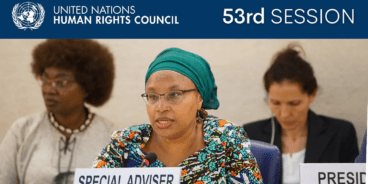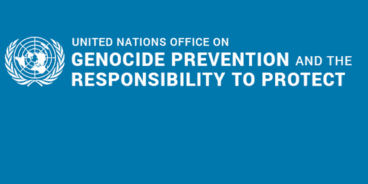Statement by the UN Special Adviser on the Prevention of Genocide on his visit to the Democratic Republic of the Congo, June 2017
(Kinshasa, 24 June 2017) I decided to come to the Democratic Republic of the Congo this week in response to alarming reports of an unprecedented deterioration in the security and human rights situation in the three Kasai provinces and increased intercommunal tensions in the east of the country, in particular in North Kivu province. My objective was to meet with the local inhabitants, political leaders and civil society to initiate a dialogue on urgent measures to be taken to end the violence, ease intercommunal tensions and relieve the suffering of civilians.
I went to Tshikapa and Kananga, where I met with the provincial authorities, civil society representatives and many victims of the violence. In Kinshasa, I had the opportunity to talk to several Government ministers, the Prime Minister, the national judicial, civil and military authorities, and civil society representatives and parliamentarians from the provinces of Kasai and North Kivu.
Unfortunately, my visit to the Kasai region confirmed my concerns. The extent of the atrocities, destruction and suffering inflicted on the civilian population by militias belonging to the Kamwina Nsapu movement, the national security forces and so-called self-defence groups, whose activities are ethnically motivated or aimed at settling scores, is quite frankly sickening. I was particularly moved by the accounts of the victims and their families, who described what they had experienced: the beheading of members of their families and representatives of the State, multiple summary executions, including of women and children, and the plundering of their possessions. I was told that entire villages, as well as public buildings, had been burnt down by members of Kamwina Nsapu militias but that, regrettably, in certain areas, the security forces
and other militias had been responsible for twice as much destruction. Children seem to be the victims most affected by this violence. Children are recruited to be used as human shields or as soldiers, and then become the primary targets of military operations.
The crisis in Kasai also has a humanitarian dimension. There are more than 1.2 million displaced persons in the Greater Kasai region, and 30,000 refugees have entered Angola. The destruction of schools puts the future of an entire generation at risk. This violence must be stopped as a matter of urgency. There is no military solution to this conflict. The violence unleashed by the Kamwina Nsapu is intolerable, and credible and systematic prosecutions should be brought in response to the movement’s crimes. The scorched-earth policy practised by certain units of the armed forces in several territories in the region, the disproportionate and indiscriminate use of force against the civilian population and the mobilization and arming of auxiliary militias, in particular those based on ethnic lines, are equally unacceptable, and their leaders should face the full force of the law. Combating impunity is essential in order to effectively prevent new atrocities.
The Government bears the primary responsibility for protecting its populations. I have presented my conclusions to His Excellency Prime Minister Bruno Tshibala and am encouraged at his willingness to share them. It is imperative to immediately reduce the militarization of the Government’s response and to prioritize instead a dialogue with all parties to the conflict in order to enable humanitarian access, free the children mobilized by militias, facilitate a civil disarmament programme and move towards the non-violent resolution of the conflict.
I encourage the Government, as I did in Tanganyika, to enhance the capacity of the national police force to restore the civil authority of the State and prevent the excessive use of force. Today I welcome the efforts of the provincial authorities and the Ministry of the Interior to establish a consultation and reconciliation framework with traditional leaders and to organize a peace and reconciliation forum with a view to bringing about the peaceful resolution of the local conflicts and the tensions affecting the region, which were the root cause of the Kamwina Nsapu revolt. I encourage them to pursue those efforts through transparent consultations and close partnership with civil society.
I call on the Military Prosecutor’s Department, which has already initiated legal proceedings against the security forces, to significantly increase its efforts and, if necessary, to make an urgent appeal for regional and international support to resolutely prosecute the crimes committed by militias and the defence and security forces. Its action should be at the centre of efforts to prevent renewed violence, resolve the crisis and bring about healing in order to restore civilian confidence in the Government and its institutions. I stand ready to help mobilize the resources aimed at supporting such efforts.
I have also asked the Minister of the Interior to publicly condemn the formation and mobilization of self-defence groups and militias by politicians throughout the country and to have police investigations carried out to enable the Office of the Attorney-General of the Republic to undertake the necessary prosecutions. On the eve of an electoral process that promises to be difficult, prosecuting politicians who mobilize armed groups or incite their communities to hatred is part of a violence-prevention policy essential to the stability of the country.
These dangerous practices, which severely affect North Kivu and other provinces, must be stopped immediately. The Government, the provincial authorities and the entire political class of North Kivu have an urgent responsibility to prevent a new outbreak of intercommunal violence in the province, the dissemination of hate speech in the media and on social networks and the forced displacement of people. The Minister of Human Rights and I have agreed that I will support the swift development of appropriate legislation to punish hate speech that constitutes incitement to violence and discrimination in the country. At this point, I would like to commend the efforts that have been made, and the progress that has been achieved, in the area of
combating sexual violence and the recruitment of children by the Personal Representative of the Head of State and the justice system of the Democratic Republic of the Congo. I encourage them to actively continue those efforts.
Now that voter registration has begun, the Democratic Republic of the Congo is once again at a critical juncture in its history. It is up to all political leaders, whether they are part of the Government or the opposition, to ensure that a new crisis does not arise in the coming months. I will continue to follow the situation closely and will keep the Secretary-General up-to-date. My Office stands ready to work with all Congolese to prevent such a scenario and to support the transition towards the holding of free, non-violent and democratic elections.
Thank you.

